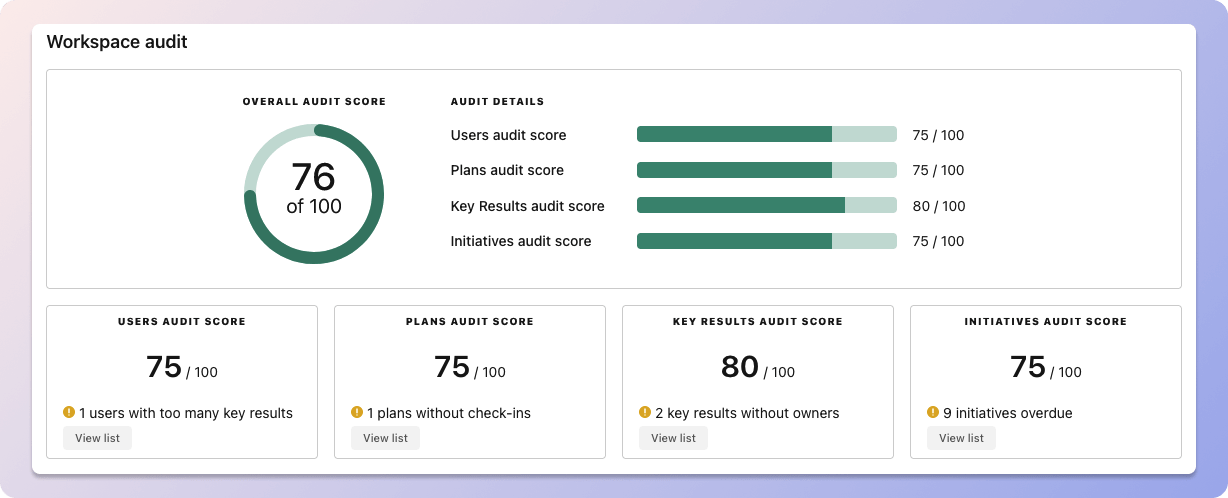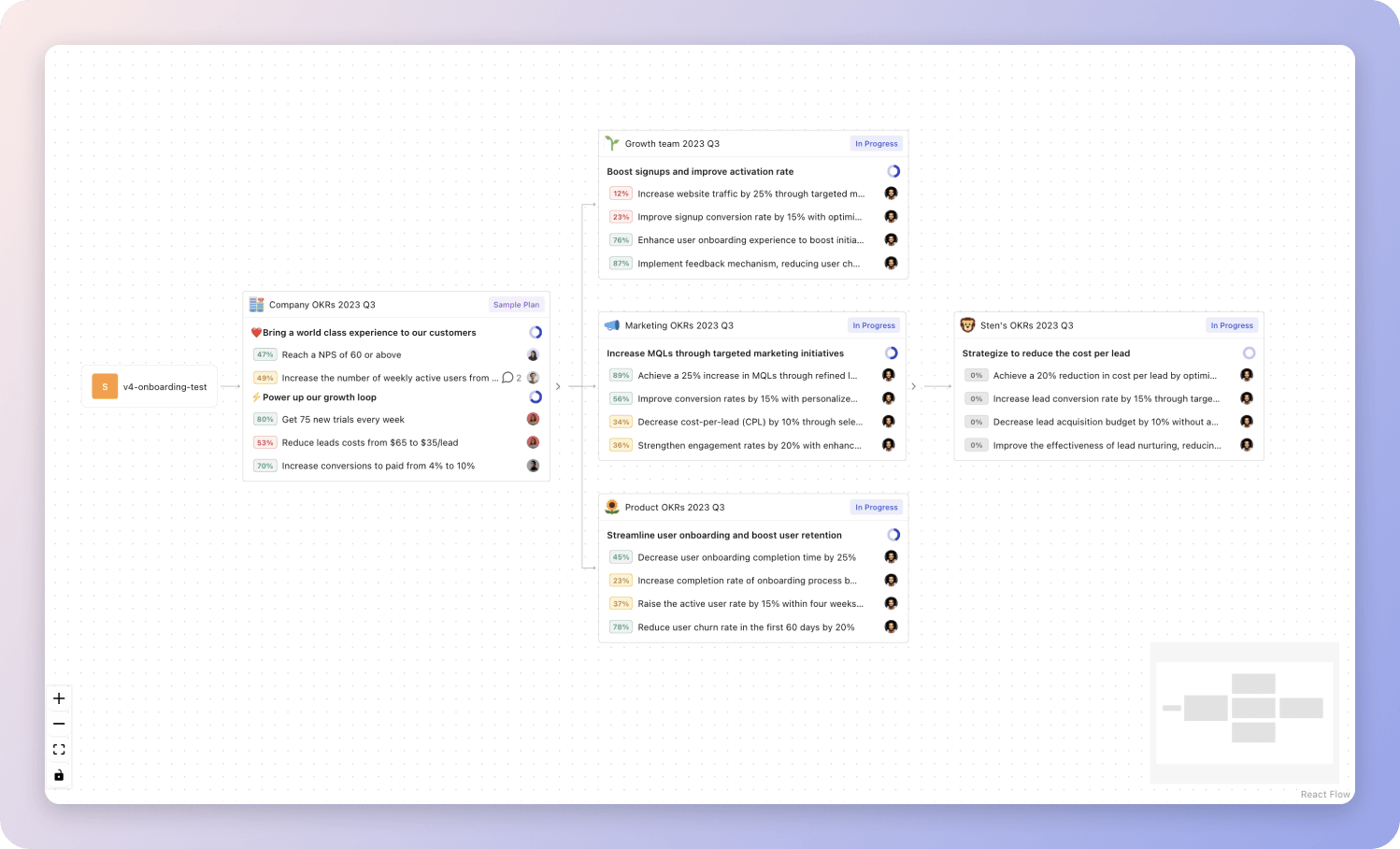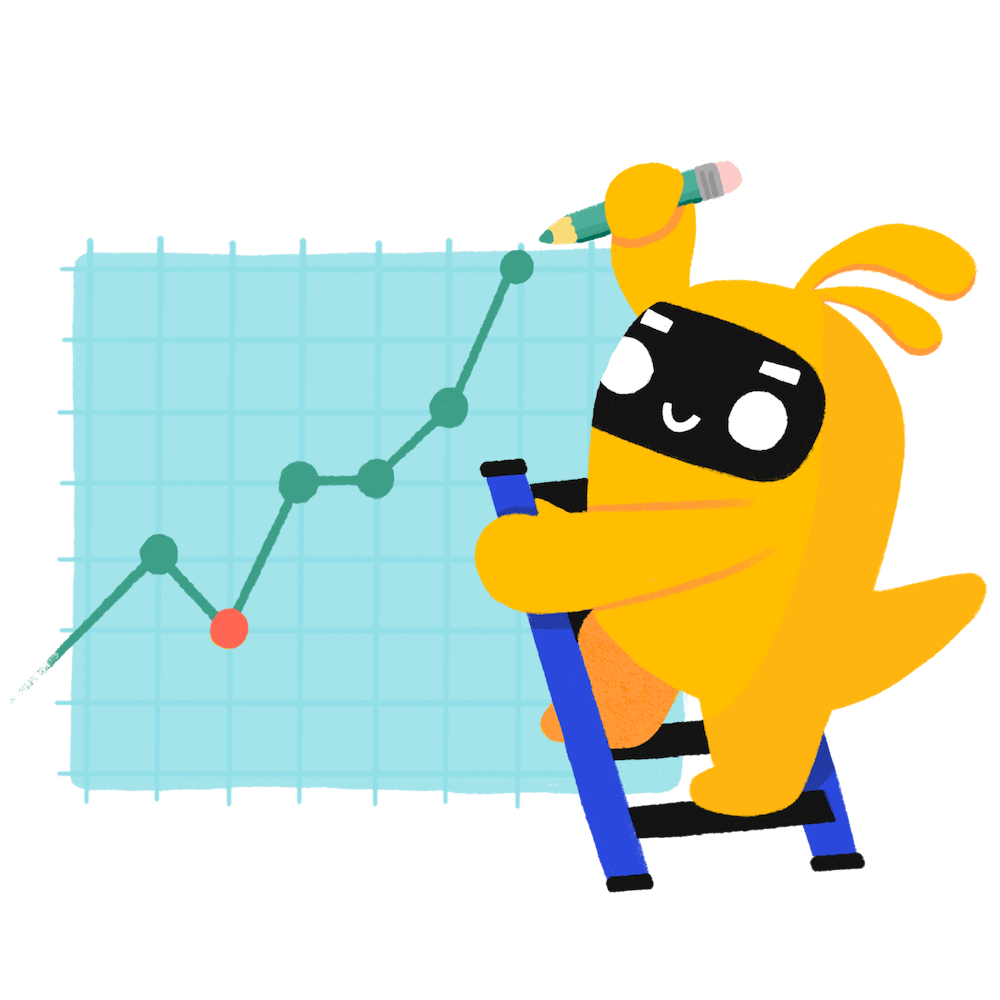1 customisable OKR examples for Typescript Learner
What are Typescript Learner OKRs?
The Objective and Key Results (OKR) framework is a simple goal-setting methodology that was introduced at Intel by Andy Grove in the 70s. It became popular after John Doerr introduced it to Google in the 90s, and it's now used by teams of all sizes to set and track ambitious goals at scale.
Crafting effective OKRs can be challenging, particularly for beginners. Emphasizing outcomes rather than projects should be the core of your planning.
We have a collection of OKRs examples for Typescript Learner to give you some inspiration. You can use any of the templates below as a starting point for your OKRs.
If you want to learn more about the framework, you can read our OKR guide online.
Building your own Typescript Learner OKRs with AI
While we have some examples available, it's likely that you'll have specific scenarios that aren't covered here. You can use our free AI generator below or our more complete goal-setting system to generate your own OKRs.
Feel free to explore our tools:
- Use our free OKR generator
- Use Tability, a complete platform to set and track OKRs and initiatives, including a GPT-4 powered goal generator
Our customisable Typescript Learner OKRs examples
We've added many examples of Typescript Learner Objectives and Key Results, but we did not stop there. Understanding the difference between OKRs and projects is important, so we also added examples of strategic initiatives that relate to the OKRs.
Hope you'll find this helpful!
1. OKRs to develop proficiency in TypeScript
Develop proficiency in TypeScript
Participate in a minimum of three collaborative projects involving TypeScript, showcasing effective teamwork and contributions
Contribute effectively to the TypeScript projects by sharing ideas and working collaboratively
Communicate and request to participate in the identified projects
Showcasing the completed projects to highlight the effective teamwork and individual contributions
Identify three collaborative projects involving TypeScript
Write TypeScript code for at least two personal coding projects, covering different areas of application
Plan and brainstorm ideas for two personal coding projects
Write TypeScript code for the first coding project, covering its designated area
Write TypeScript code for the second coding project, covering its designated area
Research and choose different areas of application for each coding project
Create a portfolio showcasing TypeScript projects with detailed explanations, attracting positive feedback from peers or potential employers
Share the portfolio with peers and potential employers through online platforms or personal networking
Provide detailed explanations and documentation for each project, highlighting their purpose and technical details
Identify a diverse range of TypeScript projects to include in the portfolio
Actively seek feedback from peers and potential employers to continuously improve the portfolio
Complete an online TypeScript course and pass all assessments with a score of 90% or above
Take all assessments seriously, review all material thoroughly, and aim for a score of 90% or above
Research and choose a reputable online TypeScript course that covers all necessary topics
Engage in active learning by practicing coding exercises and seeking clarification when needed
Create a study schedule with dedicated time slots and milestones for completing each module
Typescript Learner OKR best practices to boost success
Generally speaking, your objectives should be ambitious yet achievable, and your key results should be measurable and time-bound (using the SMART framework can be helpful). It is also recommended to list strategic initiatives under your key results, as it'll help you avoid the common mistake of listing projects in your KRs.
Here are a couple of best practices extracted from our OKR implementation guide 👇
Tip #1: Limit the number of key results
The #1 role of OKRs is to help you and your team focus on what really matters. Business-as-usual activities will still be happening, but you do not need to track your entire roadmap in the OKRs.
We recommend having 3-4 objectives, and 3-4 key results per objective. A platform like Tability can run audits on your data to help you identify the plans that have too many goals.
 Tability's audit dashboard will highlight opportunities to improve OKRs
Tability's audit dashboard will highlight opportunities to improve OKRsTip #2: Commit to weekly OKR check-ins
Don't fall into the set-and-forget trap. It is important to adopt a weekly check-in process to get the full value of your OKRs and make your strategy agile – otherwise this is nothing more than a reporting exercise.
Being able to see trends for your key results will also keep yourself honest.
 Tability's check-ins will save you hours and increase transparency
Tability's check-ins will save you hours and increase transparencyTip #3: No more than 2 yellow statuses in a row
Yes, this is another tip for goal-tracking instead of goal-setting (but you'll get plenty of OKR examples above). But, once you have your goals defined, it will be your ability to keep the right sense of urgency that will make the difference.
As a rule of thumb, it's best to avoid having more than 2 yellow/at risk statuses in a row.
Make a call on the 3rd update. You should be either back on track, or off track. This sounds harsh but it's the best way to signal risks early enough to fix things.
How to turn your Typescript Learner OKRs in a strategy map
Quarterly OKRs should have weekly updates to get all the benefits from the framework. Reviewing progress periodically has several advantages:
- It brings the goals back to the top of the mind
- It will highlight poorly set OKRs
- It will surface execution risks
- It improves transparency and accountability
Spreadsheets are enough to get started. Then, once you need to scale you can use a proper OKR platform to make things easier.
 Tability's Strategy Map makes it easy to see all your org's OKRs
Tability's Strategy Map makes it easy to see all your org's OKRsIf you're not yet set on a tool, you can check out the 5 best OKR tracking templates guide to find the best way to monitor progress during the quarter.
More Typescript Learner OKR templates
We have more templates to help you draft your team goals and OKRs.
OKRs to radically boost fundraising efficacy and secure debt and equity
OKRs to minimize escalation cases in customer service
OKRs to get better at public speaking
OKRs to enhance stakeholder communication for improved transparency and reporting
OKRs to increase operational efficiency significantly
OKRs to improve efficiency in meeting deadlines and deliverables
OKRs resources
Here are a list of resources to help you adopt the Objectives and Key Results framework.
- To learn: What is the meaning of OKRs
- Blog posts: ODT Blog
- Success metrics: KPIs examples
Create more examples in our app
You can use Tability to create OKRs with AI – and keep yourself accountable 👀
Tability is a unique goal-tracking platform built to save hours at work and help teams stay on top of their goals.
 1 Create your workspace
1 Create your workspace 2 Build plans in seconds with AI
2 Build plans in seconds with AI 3Track your progress
3Track your progress